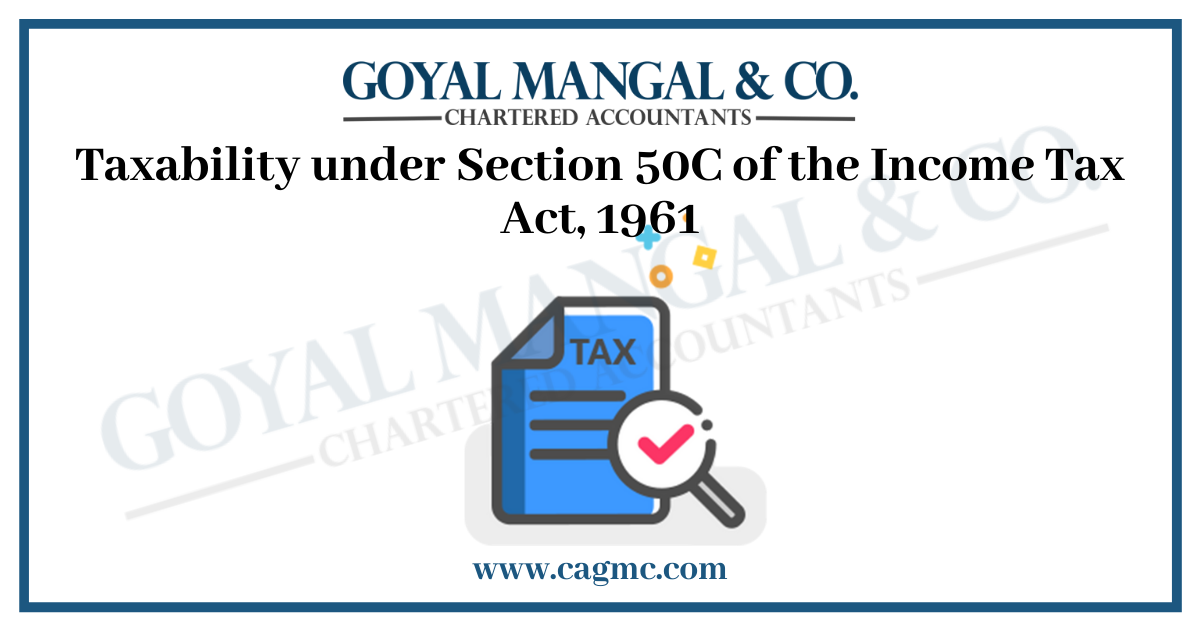
Land and Building is considered to be an ideal investment and revenue generating source in Indian society. This believes is backed by the high capital return and increased market value over the years of buying the property. Due to this many people started investing in land and property, thus making loads of profit over the years. This new capital revenue generating source led to insertion of new section i.e., Section 50C under the Income Tax Act, 1961.
| Table of Content |
What is Section 50C?
This section deals out with the capital gain tax levied upon the sales consideration received or claimed by the seller at the time of sale of land, building or both, or value adopted by the Stamp Valuation Authority in some cases*.
*Wherein the sales consideration received or receivable is lower the value adopted by the Stamp Valuation Authority (SVA) (for the very purpose of levying the stamp duty on transfer of the property), the SVA value further reduced by the cost/ indexation is considered for the purpose of calculating the capital gain. This is only applicable when the variation among the values is more than 10% with effect from 01.04.2021 (earlier it was 5%).
Consequences of having lower selling prices than value adopted by SVA
As everyone is aware of the fact that the negotiation takes time therefore sometimes the date of entering into the agreement for sale of land, building or both and the date of registering the former the sale is not same. Therefore, many people get confused about the amount of sales consideration to be adopted in this case i.e., whether it should be the value assessed by the SVA on the date of agreement or the value assessed on the date of registration of sale of land or building or both.
So, in this case the value assessed on the date of agreement should be adopted for calculating capital gain provided that a part or portion of sale consideration should be received by the way of account payee cheque, bank draft or ECS on or before the date of agreement of selling off the property.
In other case, wherein the assessee claims that the value or consideration received by him is justified as per the fair market value. In this case the assessee is provided with a remedy to address the income tax authority in case he is not satisfied by the value adopted or assessed by the SVA or thinks it is highly inflated and does not reflects the true market value. Herein the Income tax authority will approach a valuation officer, who will further value the property according to the market conditions. After, his thorough examination the valuation officer will conclude either of the following two outcomes:
| When the value as per SVA is higher than the Fair value concluded by the Valuation Officer. | When the value as per SVA is lower than the Fair value concluded by the Valuation Officer. |
| In this circumstance Fair value determined by the Valuation officer will be adopted for the purpose of calculating the capital gain. | In this circumstance the value assessed by the SVA is taken into consideration for the purpose of calculating the capital gain. |
In case where the assessee is not satisfied with the fair value determined by the Valuation officer he/ she can appeal before the higher authorities.
Let’s understand this section more by the way of few illustrations.
Illustration 1.
Mr. A sells a land for Rs. 2500000, the agreement to sell the property was made on 30.5.2020 and Rs 500000 were received by him on 25.05.2020 but the property was registered on 30.06.2020. The value as per SVA is Rs. 4500000 on 30.05.2020, Rs. 4600000 on 25.05.2020 and Rs. 3600000 on 30.06.2020. What will be the sales consideration in this case?
In this case Mr A’s sales consideration is less than the value as per SVA therefore value as per SVA on the date of entering into agreement i.e. 30.5.2020 Rs. 4500000 will be the sales consideration for the purpose of calculating the capital gain.
Illustration 2.
Continuing the above illustration, Mr. A is not satisfied with the value adopted by the SVA, so he decides to appeal before the income tax authority and the income tax officer approaches a Valuation officer for determining the Fair value of the property. The Valuation officer quotes down the following fair values-
-
- Rs. 3200000
- Rs. 5200000
What will be the value of sales consideration in above both cases?
-
- Here, the sales consideration will be Rs. 3200000, the fair value as determined by the Valuation officer.
- Here, the sales consideration will be Rs. 4500000, the value assessed by the SVA.
Conclusion
Thus, income tax authority via this section provides the assessee full transparency and freedom to recheck the values determined by the SVA while putting a checkmark on the people who try to indulge in unfair transactions for getting relieved by the tax to be paid. While the safe harbour rate (i.e., 10%) protects the genuine transactions in real estate by giving the flexibility for inflation and other factors in the respective market conditions.


